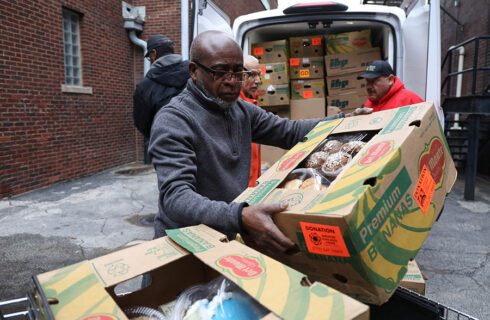In 2010, the Commission to End Hunger was appointed by Gov. Pat Quinn with the mission of developing a two-year plan to end hunger in Illinois. The Commission is responsible for developing this action plan, reviewing its progress, and ensuring cross-collaboration among government entities and the community. Comprised of legislators and community leaders who are committed to this mission, the Commission is conducting a listening tour this summer and fall, to learn firsthand how hunger is affecting men, women and children across Illinois. The Commission is co-chaired by Kate Maehr, executive director and CEO of the Greater Chicago Food Depository.
The Illinois Commission to End Hunger began its statewide listening tour on July 10 in Rantoul, a farming community surrounded by the picturesque cornfields of central Illinois. The Commission’s goal: uncovering (and eventually correcting) the crises of food insecurity and hunger facing migrant and seasonal farm workers.
Each summer, waves of farm workers arrive in this once-thriving town, which has struggled to maintain a dwindling population after the local Air Force base closed in the mid-1990s. Today, Rantoul looks like so many other American towns: Its film set-ready central business district, lined with the shells of small, independent shops, is all but abandoned.
The migrant workers who arrive in Rantoul are hired by local farmers to de-tassel corn or handle other crops. They work long days in unforgiving weather conditions, and frequently wait weeks for their first paychecks, a lapse that makes it nearly impossible to feed their families.
Five of the 21 state-appointed commissioners were on hand Sunday to hear from members of the Illinois Migrant Council, an advocacy group started in 1966 to address the health, employment, housing and educational needs of the state’s estimated 30,000 seasonal farm workers. Eloy Salazar, the group’s executive director, spoke passionately about the need for increased funding for food programs and the workers’ daily struggles to survive.
“Most farm workers have to really stretch their pay and their food just to get to the next paycheck,” Salazar said. “They choose between fuel to get to work and food to feed their families. That’s the experience of many workers. And in the extreme cases, where there’s not enough work, and no pay, the children in these families will go hungry.” Long-term inadequate nutrition can lead to serious, long-term health problems, he said – which go untreated due to lack of care options, often derailing work during the crucial seasonal window.
The Commission will present its reports and updates on progress to the governor and General Assembly annually, beginning in March 2012. Be sure to check back in with the Food Depository blog as it chronicles the Commission's listening tour and for the dates and locations of the tour's Cook County stops.
Share This Post



